

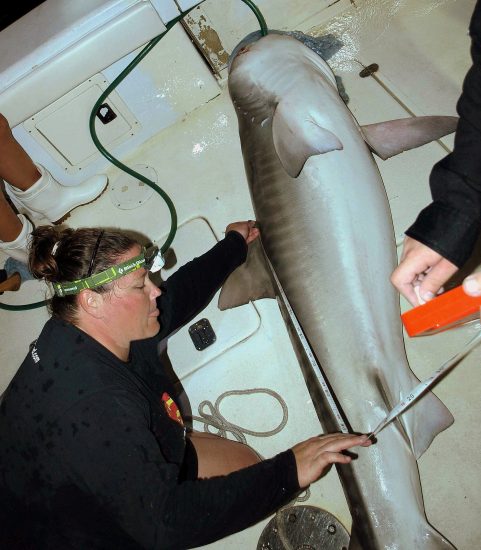
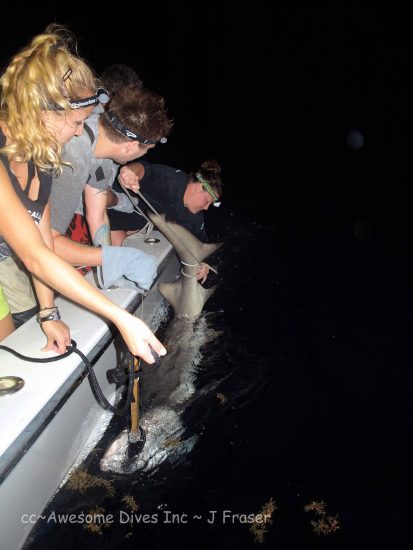
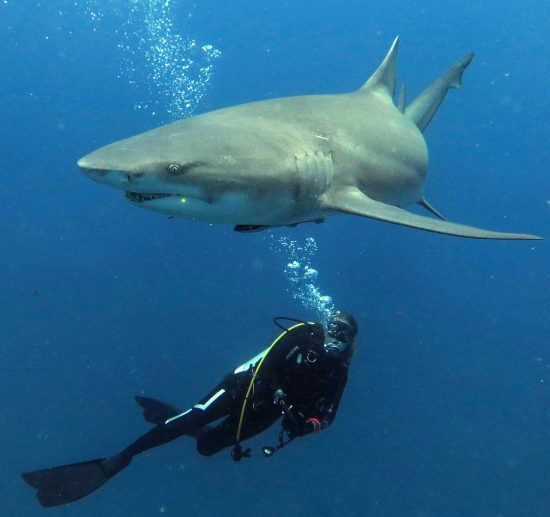
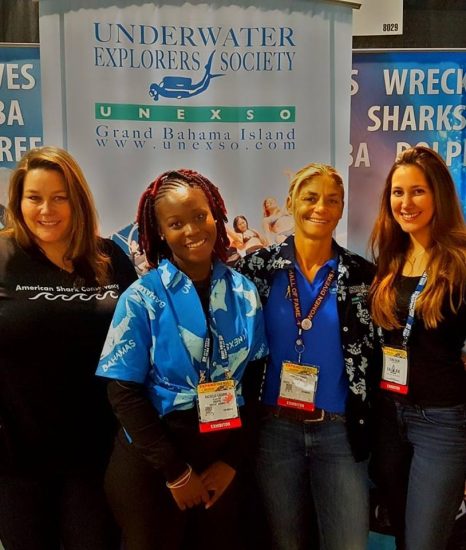
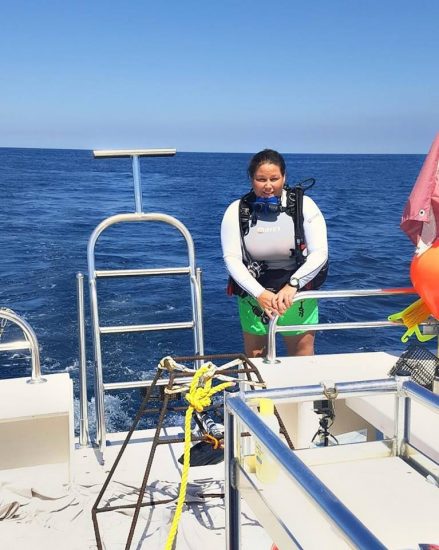
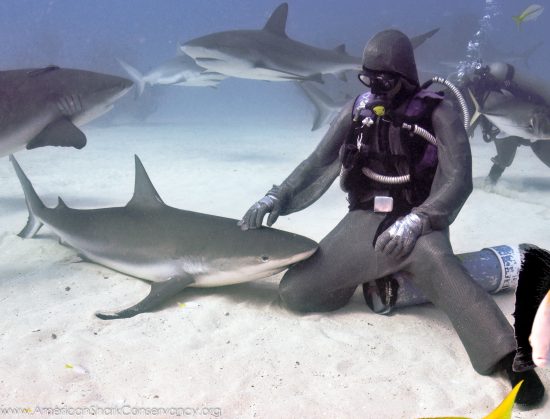
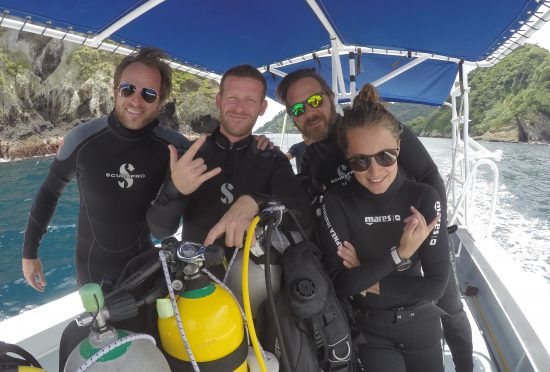
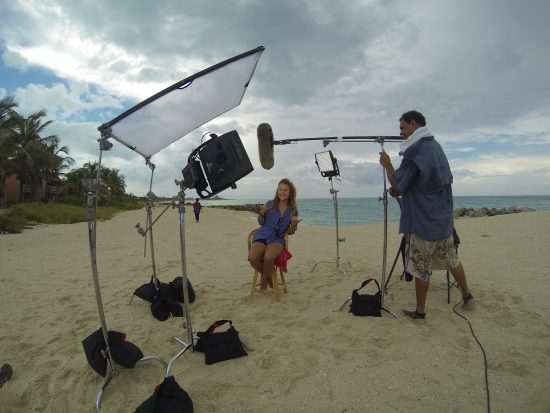
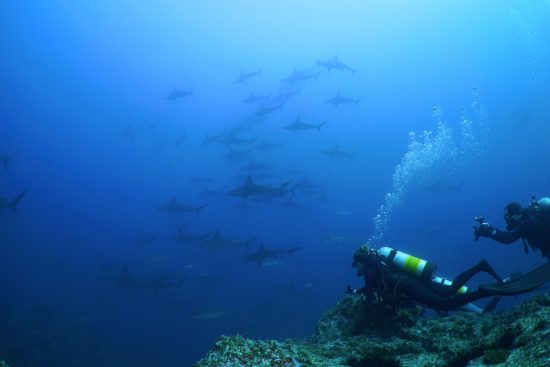
No doubt about it, Discovery Channel’s Shark Week gets a lot of attention with more than 2.5 million viewers in 2015. However, the network has been criticized for focusing only on the few large and charismatic species like great white sharks while ignoring 400+ other species, sensationalizing shark attacks despite their rarity, causing mass confusion with a mockumentary about the existence of Megalodon sharks (they are EXTINCT), and missing major opportunities to support conservation efforts.
At the same time, I can credit a Shark Week documentary for getting me involved in shark research. After watching Air Jaws, I knew I had to get to South Africa to see great whites breaching out of the water, which led me to graduate school at the University of Cape Town, where I worked on several shark research projects. This propelled me into my role now researching and advocating for coastal sharks in Florida. But I couldn’t help wondering… with so many cool shark species out there, innovative science and interesting questions being asked, why was Shark Week focused on such narrow subjects?
Slowly, over the past few years, it seems Discovery is striking a better balance with “edu-tainment” style programs. New shows are featuring real scientists discussing their research and contributing facts, not just hyped up scare tactics. Programs like “Alien Sharks” increase the exposure of little known shark species like the frilled shark. Sharkopedia is the informational page hosted on Discovery’s website and Shark Week is supporting some conservation efforts.
One major miss, in my opinion, is a lack of diversity in hosts and presenters. Very few on-screen contributors are women, even though I can quickly name dozens of female researchers and advocates that could significantly contribute to the programs. I have female colleagues that are slogging
through mangroves studying lemons sharks, tracking down endangered sawfish in Africa, using DNA analysis to trace illegal shark catches, teaching thousands of kids every year to care about sharks, and fighting on an international scale to enact better protections for sharks worldwide…just to name a few.
When I started watching Shark Week, I wanted to see the sharks and would suffer through the attack re-enactments, fake blood, and girls in bikinis to learn what I could. I was thrilled to see Dr. Alison Kock finally featured a few years ago, fully-clothed, talking about her work on the movements of great white sharks along False Bay, South Africa. It seemed about time since she was the only scientist working in the area on these sharks that had been the mainstay of Shark Week for years. And this year, even more female friends are being featured. Victoria Elena Vasquez, a researcher from California, is on “Alien Sharks”, Lindsay Graff and Cristina Zenato are on “Sharktacular”, and Barbara Wueringer’s work is featured on the sawfish show. The work of others is featured throughout the week.
My friend and fellow Mares sponsored diver, Ornella Weideli, is featured on “Shark Storm”. Ornella is a PhD candidate with incredible field experience investigating aspects of several shark species’ life histories, community ecology and dietary patterns. She has studied the diets of young lemon sharks in the Bahamas, worked with large species like hammerheads in Florida and dived with massive bull sharks in FIji. She is currently working on her PhD project using creative techniques to learn how juvenile sicklefin lemon sharks and blacktip reef sharks coexist in shallow nursery areas on an isolated atoll of the Seychelles in the middle of the Indian Ocean.
Co-leading the science on “Shark Storm” with Dr. Tristan Guttridge, Ornella and the team shows viewers the social behaviors of sharks in incredible locations from Cocos Island, Mexico, to the Bahamas. She will also be showing millions of viewers that women can do all aspects of shark research.
In 2012, Ornella and I, along with Ruth Harries and Lindsay Biermann made up four of the 6-person science team, tagging large coastal sharks in Jupiter, Florida. One night, an award-winning journalist and his film crew joined us on the boat. After interviewing the lead scientist, who happened
to be male, the journalist turned to us four and his only question was “What is it like being girls in this field?” This question seemed irrelevant since he
had just watched us handle an 8.5-foot lemon shark, collect blood and tissue samples, measure her from nose to tail, record the data and release the animal in just a few minutes. I commented that the field of sharks, like science in general, may have a reputation for being male-dominated but those of us on the ground know the reality: there is work to be done and women ARE contributing significantly.
My hope is that Discovery Channel’s Shark Week continues to integrate science and facts to educate its viewers and uses its extensive reach
to effectively support conservation. I hope producers continue to recognize the vital work of women in shark science and advocacy. Because when millions of female viewers see someone that looks like them on one of the most popular shows on TV, it is bound to inspire them to get involved and we all know sharks need the help!
Tune into Discovery Channel’s Shark Week starting July 23rd for all the shows mentioned above and many other programs and follow our Twitter conversations about the programs @SharkStudies using hashtags #SharkWeek and #WomeninStem and #SharkLadies
 Hannah
Hannah 21st July 2017
21st July 2017 Jupiter, Florida, United States
Jupiter, Florida, United States 
